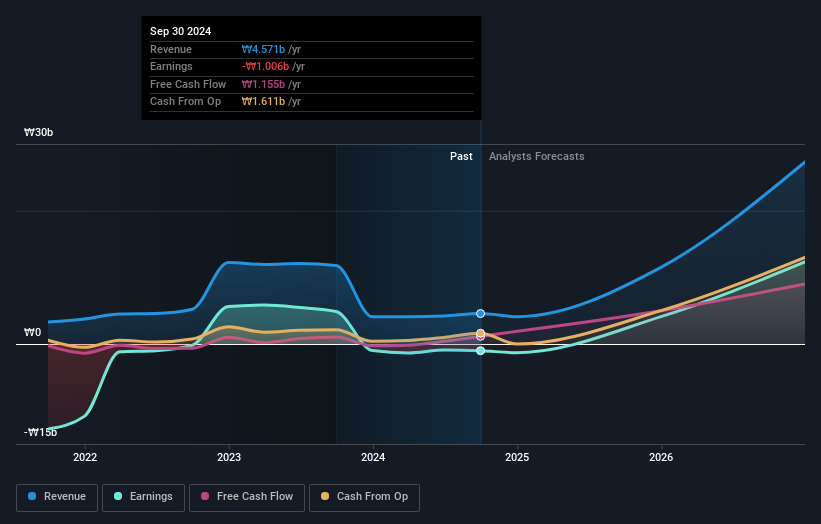- South Korea
- /
- Medical Equipment
- /
- KOSDAQ:A314930
Biodyne Co., Ltd.'s (KOSDAQ:314930) stock price dropped 17% last week; individual investors would not be happy

Key Insights
- The considerable ownership by individual investors in Biodyne indicates that they collectively have a greater say in management and business strategy
- A total of 8 investors have a majority stake in the company with 48% ownership
- 47% of Biodyne is held by insiders
A look at the shareholders of Biodyne Co., Ltd. (KOSDAQ:314930) can tell us which group is most powerful. The group holding the most number of shares in the company, around 52% to be precise, is individual investors. Put another way, the group faces the maximum upside potential (or downside risk).
While the holdings of individual investors took a hit after last week’s 17% price drop, insiders with their 47% also suffered.
Let's take a closer look to see what the different types of shareholders can tell us about Biodyne.
See our latest analysis for Biodyne

What Does The Institutional Ownership Tell Us About Biodyne?
Institutions typically measure themselves against a benchmark when reporting to their own investors, so they often become more enthusiastic about a stock once it's included in a major index. We would expect most companies to have some institutions on the register, especially if they are growing.
Institutions have a very small stake in Biodyne. That indicates that the company is on the radar of some funds, but it isn't particularly popular with professional investors at the moment. So if the company itself can improve over time, we may well see more institutional buyers in the future. It is not uncommon to see a big share price rise if multiple institutional investors are trying to buy into a stock at the same time. So check out the historic earnings trajectory, below, but keep in mind it's the future that counts most.

Biodyne is not owned by hedge funds. With a 46% stake, CEO Wook-bin Im is the largest shareholder. With 0.5% and 0.4% of the shares outstanding respectively, Dimensional Fund Advisors LP and Samsung Asset Management Company, Ltd. are the second and third largest shareholders.
Our studies suggest that the top 8 shareholders collectively control less than half of the company's shares, meaning that the company's shares are widely disseminated and there is no dominant shareholder.
While studying institutional ownership for a company can add value to your research, it is also a good practice to research analyst recommendations to get a deeper understand of a stock's expected performance. There is some analyst coverage of the stock, but it could still become more well known, with time.
Insider Ownership Of Biodyne
The definition of an insider can differ slightly between different countries, but members of the board of directors always count. The company management answer to the board and the latter should represent the interests of shareholders. Notably, sometimes top-level managers are on the board themselves.
Most consider insider ownership a positive because it can indicate the board is well aligned with other shareholders. However, on some occasions too much power is concentrated within this group.
It seems insiders own a significant proportion of Biodyne Co., Ltd.. It has a market capitalization of just ₩438b, and insiders have ₩204b worth of shares in their own names. It is great to see insiders so invested in the business. It might be worth checking if those insiders have been buying recently.
General Public Ownership
The general public, mostly comprising of individual investors, collectively holds 52% of Biodyne shares. This size of ownership gives investors from the general public some collective power. They can and probably do influence decisions on executive compensation, dividend policies and proposed business acquisitions.
Next Steps:
It's always worth thinking about the different groups who own shares in a company. But to understand Biodyne better, we need to consider many other factors. Consider for instance, the ever-present spectre of investment risk. We've identified 2 warning signs with Biodyne (at least 1 which is potentially serious) , and understanding them should be part of your investment process.
If you would prefer discover what analysts are predicting in terms of future growth, do not miss this free report on analyst forecasts.
NB: Figures in this article are calculated using data from the last twelve months, which refer to the 12-month period ending on the last date of the month the financial statement is dated. This may not be consistent with full year annual report figures.
Valuation is complex, but we're here to simplify it.
Discover if Biodyne might be undervalued or overvalued with our detailed analysis, featuring fair value estimates, potential risks, dividends, insider trades, and its financial condition.
Access Free AnalysisHave feedback on this article? Concerned about the content? Get in touch with us directly. Alternatively, email editorial-team (at) simplywallst.com.
This article by Simply Wall St is general in nature. We provide commentary based on historical data and analyst forecasts only using an unbiased methodology and our articles are not intended to be financial advice. It does not constitute a recommendation to buy or sell any stock, and does not take account of your objectives, or your financial situation. We aim to bring you long-term focused analysis driven by fundamental data. Note that our analysis may not factor in the latest price-sensitive company announcements or qualitative material. Simply Wall St has no position in any stocks mentioned.
About KOSDAQ:A314930
Biodyne
Develops and manufacturers medical devices, reagents, and consumables in South Korea.
Flawless balance sheet with high growth potential.


